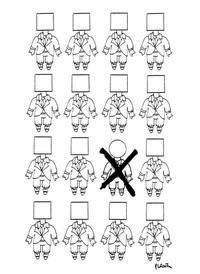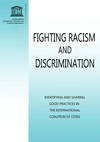International Coalition of Inclusive and Sustainable Cities − ICCAR – Examples of Good Practices

© UNESCO / Plantu
The fight against racism and discrimination has always been at the heart of UNESCO’s mandate. The Organization works on many fronts to address the challenges faced in today’s world. Nowadays, when racism and discrimination can take different forms, some more some less visible, there is a need for a cooperative strategy to promote and provide human rights.
It is in this context that UNESCO launched the International Coalition of Inclusive and Sustainable Cities − ICCAR in 2004. This is a network of more than 500 cities with a common commitment to develop and enhance policies related to the fight against racism, discrimination and xenophobia. ICCAR provides a structure for an on-going dialogue and the sharing of knowledge on international, national and local levels. To more effectively identify and respond to the unique contexts and priorities of its members, the network is composed of six regional coalitions (Africa, the Arab region, Asia and the Pacific, Canada, Europe, and Latin America and the Caribbean).
The ICCAR initiative puts cities at the core of anti-discrimination work. Cities, as places of ethnocultural diversity, play a key role in mobilising interest and resources, and in developing and implementing anti-discrimination policies and programmes that have the potential to make a real impact on the ground. Local authorities often also have access to a range of local actors, organisations and networks to facilitate the collection and dissemination of information, the ability to evaluate the necessity and impact of current municipal programmes and activities, and the authority to affirm and support the well-being of its citizenry through various anti-discriminatory measures.
The profiles featured on this website showcase results of years of UNESCO’s involvement and work with the International Coalition of Inclusive and Sustainable Cities − ICCAR. They feature examples of good practices adopted by cities to address racism and discrimination in their midst and to fulfil their commitments under the regional Ten Point Plans of Action. The practices chosen highlight the different roles and domains of the cities’ work, including the role of the city as policy-maker, as service provider, as employer, its role in networking and partnerships, and its efforts to promote inclusion and community-building.
The good practices have been collected from 38 cities, members of the regional coalitions of ICCAR. They represent a fraction of what ICCAR’s cities around the world have been doing to ensure and promote equality and tolerance. They provide a picture of how cities, even with limited competencies, limited funding or despite systemic and structural concerns, have found different ways to address discrimination successfully.
Both UNESCO and ICCAR hope that these featured practices will inspire and inform the policies and practices of other cities across the world.
Just Published
Fighting racism and discrimination. Identifying and sharing good practices in the International Coalition of Cities
The International Coalition of Inclusive and Sustainable Cities − ICCAR was launched by UNESCO in 2004 as a network of cities with a common commitment in the struggle against discrimination. This report features more than 50 good practices of more than 38 cities of the Coalition.

